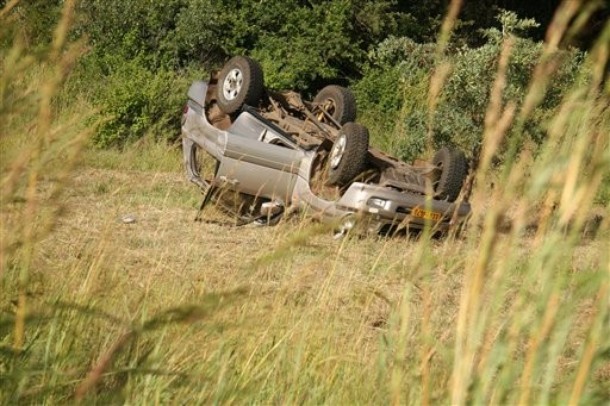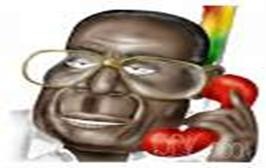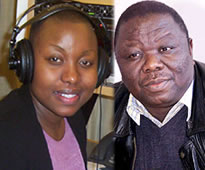Welcome to the Internet, President Mugabe
By Geoff Nyarota
http://www.thezimbabwetimes.com/index.php?option=com_content&task=view&id=208
Three unrelated events over the past two weeks have underscored the disdain and cavalier approach of Zimbabwe’s ruling elite towards press freedom issues.
In a truly democratic environment freedom of the press entails the guarantee by a government to news-gathering organizations of free access to information and the freedom to publish such information without let or hindrance. The same freedom is also extended to members of the public to access that disseminated information. With such access to information from various sources the public is better equipped to make decisions on matters that affect their lives.
For any situation approximating the above to be achieved in Zimbabwe the media landscape requires a complete overhaul, especially in the government’s media empire which has long ceased to inform in the public interest. The cause of the poor performance and the attendant decline in public appeal are no mystery to those charged with running government’s newspapers and electronic media. But many of them are appointed, not on the basis of their recognized talent or experience, but on their assumed propensity and obsession with presenting to the world a positive image of government at all costs
Leo Mugabe, the honourable Member of Parliament for Makonde, is an extraordinary business entrepreneur. He tries to make a success of the most unlikely ventures, including where he has no known skills. His term of office as ZIFA chairman was controversy-ridden. He is the chairman of the Parliamentary Portfolio Committee on Transport and Communications. Above all he is a devoted nephew of President Robert. His mother, Sabina, the President’s only sister, is also a Member of Parliament, while his brother Patrick Zhuwawo, serves in the capacity of Deputy Minister of Science and Technology Development
In his capacity as chairman of the parliamentary committee Leo Mugabe had occasion recently to present before the august House his committee’s report on the 2007 budget allocations to the Ministry of Information and Publicity.
There has been much turbulence in this ministry during the course of 2006. No sooner had the ministry lost its minister, Tichaona Jokonya, in rather tragically peculiar circumstances, than the deputy minister Bright Matonga was embroiled in serious allegations of grand-scale sleaze when he was chief executive of the Zimbabwe Omnibus Company, Zupco. The case which has already claimed the scalp of the bus company’s former chairman, Charles Nherera, appears set to bag another scalp that of controversial Local Government Minister Ignatius Chombo.
Notwithstanding his current ignominious circumstances, Chombo was appointed to the Zanu-PF politburo over the weekend. President Mugabe has an uncanny predilection with appointment to the upper echelons of the government machinery officials who sooner or later tarnish the image of our country through their involvement in allegations of corruption.
To ensure that such acts of corruption are kept under wraps, government has gone out of its way to render Zimbabwe Newspapers (1980) Ltd, the Zimbabwe Broadcasting Corporation (ZBC) and New Ziana through gross interference in their editorial operations. Government media outlets have become discredited, unpopular and, therefore, totally unprofitable. Successive ministers of information have, each in their own unique style, attempted to turn these once profitable organisations, which government owns and controls, into commercially viable operations. Successive CEOs at ZBC, in particular, have discovered to their chagrin that one cannot turn around the fortunes of a media organisation, unless there is minimum government interference.
Leo Mugabe told Parliament that New Ziana, Transmedia Corporation (whatever that is) and the Zimbabwe Broadcasting Corporation should join hands to start a "visual raw footage distribution service" to international broadcasters. This initiative would maximise their revenue earnings, he said.
I suppose Mugabe realizes that the said visual raw footage must be of a quality that is appealing to the said international broadcasters. Considering that the appalling output of ZTV has driven thousands of foreign currency-strapped Zimbabweans to import expensive satellite dishes, the issue of content rather than any proposed merger, becomes the major challenge faced by those trying to turn around the fortunes of the state broadcaster.
Mugabe told the House that such merger would enhance Ziana’s news-selling status, while earning foreign currency for its own recapitalization.
Obviously driven by what I can only perceive as a burning desire to countermand Leo Mugabe’s apparent concern for success in the operations of state-run media, the acting Minister of Information, Paul Mangwana, addressed a meeting of his own a few days after Mugabe tabled his proposal. Mangwana summoned state media editors to his office. He instructed them to ensure positive reporting on the major political issue of the day, Zanu-PF’s controversial and acrimonious project to dovetail the presidential and parliamentary elections in 2010, as well as on the just passed Zanu-PF congress.
Those who attended Mangwana’s meeting, along with permanent secretary, George Charamba, say Mangwana expressed grievous concern that the said harmonisation of presidential and parliamentary elections was not receiving positive coverage in the state media.
The Herald, which is arguably the most sycophantic of the state-owned newspapers, and its editor Pikirayi Deketeke, equally arguably the most loyal and "patriotic" of the editors, are said to have been singled out for heavy censure. They had become overly-critical of the government and engaged in what the minister described as unnecessary controversies.
By way of example the acting minister is said to have suggested that the harmonization story could definitely benefit from flavouring with ingredients such as examples from Zambia and other African countries which hold presidential, parliamentary, mayoral and council elections concurrently.
In simple terms, what Mangwana was telling the assembled editors is that the dirty linen of government or Zanu-PF should never be laundered in public. Like his predecessors, he obviously does not subscribe to any theory of transparency or accountability in governance. But it is such issues as the acting minister’s high-handed approach to press freedom issues and the content of discredited media outlets, and not necessarily packaging and marketing strategies, as proposed by Leo Mugabe, that should be the focus of any ministry official with a genuine interest in the welfare and viability of the state’s media empire.
Given the lackadaisical state of Zimbabwe’s media affairs, any heavy criticism of editors or their papers has a bearing on the performance of the permanent secretary in the Ministry of Information, who has an inordinate amount of influence over who is appointed to edit a newspaper. Therefore, stung by Mangwana’s denigration, Charamba is reported to have rushed to the rescue of The Herald and Deketeke.
He apparently pointed out to Mangwana that too much state interference had led many Zimbabweans to seek alternative sources of information, "particularly hostile online newspapers". So Charamba knows the truth after all.
The government has effectively transformed Zimpapers, ZBC and New Ziana into a well-oiled machinery for the dissemination of its own and Zanu-PF’s propaganda. Government controlled newspapers as well as radio and television are skillfully employed to attack perceived opponents of government, the so-called enemies of the state, both domestic and foreign. Government’s foes are rarely featured in the state-controlled media, except in a negative manner.
What Mangwana clearly has in mind is a return to the situation aptly captured back in 2002 by the Media Monitoring Project of Zimbabwe (ZMMP). The ZMMP declared that ZBC was guilty of bias and distortion "like never before" in the run-up to the presidential polls.
A ZMMP report pointed out that between December 1, 2001 and March 7, 2002, in the run-up to the presidential election, ZTV carried a total of 402 election campaign stories in news bulletins monitored by the organisation.
Of these, an astounding 339 (84 percent) had favoured Mugabe, the ruling Zanu-PF candidate. Only 38 stories (or a paltry nine percent) had covered the activities of the opposition Movement for Democratic Change (MDC), but "virtually all of them" were used to discredit the party and its candidate, Morgan Tsvangirai.
What Charamba would do well to explain is why Zimbabweans in large numbers are attracted to what he calls hostile online newspapers. He could launch this exercise by asking President Mugabe why he seems to have now joined the migration of readers away from the state-owned media to the allegedly hostile online and regular independent newspapers published in Harare.
Mugabe revealed to bemused members of his central committee last Thursday what, to all intents and purposes, had been a closely guarded secret about his preferred and regular sources of news and information about Zimbabwe. He did this while lambasting Zanu-PF officials for feeding online and other publications with information.
"There is information, sorry, misinformation….daily on the Internet, or in The Financial Gazette and The Independent and so on," he said. "We try to put it in a way that disguises it a bit, but it’s obvious that it’s a colleague of ours who has written it or sent the information to the Independent or the Standard."
I had no idea that the quest for the truth and a realistic appraisal of Zimbabwe’s current situation has now driven Mugabe to frequent the Internet. I felt a sense of conquest, as managing editor of The Zimbabwe Times.com, at this realization. The editors of New Zimbabwe.com, Zimonline.com, Zimdaily.com, The Zimbabwean.com, Zimobserver.com, Zimbabwejournalists.com, Changezimbabwe.com, Zimnews.com and other Zimbabwe-linked online services, too numerous to list but all spawned by Zimbabwe’s harsh media environment, must have felt the same.
The government has effectively driven scores of journalists, both Zimbabwean and foreign out of the country. Government spin doctors have tried in vain over the past few years to convince citizens that independent and foreign journalists are motivated by a malicious and unpatriotic craving to paint a negative picture of or to discredit our still beautiful but once prosperous country.
The foreign journalists have since returned to their own countries - the United Kingdom, the United States of America, Canada and various other countries that had correspondents based in Harare. Likewise, many Zimbabwean journalists were forced to leave the country of their birth. They found refuge in South Africa, the UK, the United States and Canada.
One would expect that, with the departure of these two groups of objectionable or veritable enemies of the state, there would be celebration in official circles and that Zanu-PF would live happily ever after. But, as events over the past two weeks have illustrated, this was clearly not the case.
First, Mugabe grants an exclusive interview to a Canadian television station. While the "patriotic" reporters at ZBC look on in mortification as their beloved President shares with the Canadians his innermost thoughts about his retirement. The Canadians then make a copy of their exclusive interview with the President of Zimbabwe available to the local hacks.
"You are not good enough to interview me," seems to be Mugabe’s underlying message.
As if that were not perplexing enough, it also transpires that Mugabe has virtually followed the now exiled Zimbabwean journalists all the way to the Internet where they have set up online publications.
One would expect the President to be content with reading The Herald and watching ZTV, like other patriotic Zimbabweans. But apparently he surfs the net in search of online newspapers.
Then he flips through the pages of The Financial Gazette, The Zimbabwe Independent and The Zimbabwe Standard.
Curiously, he does not mention The Daily Mirror or The Sunday Mirror.
It is not the attractive packaging or effective distribution stratagems proposed by Leo Mugabe that will achieve self-sustainability in the government’s media empire. It is the accuracy of fact, the news value and the credibility of content that draws the likes of President Mugabe to the Internet, where news articles are crafted away from the self-serving fulminations of Mangwana.
Welcome to the internet, President Mugabe!
















No comments:
Post a Comment